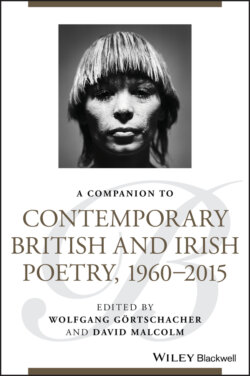Читать книгу A Companion to Contemporary British and Irish Poetry, 1960 - 2015 - Группа авторов - Страница 30
Paul Muldoon, “Moy Sand and Gravel” (2002) (Muldoon 2002, 8)
ОглавлениеDespite its business‐like, seemingly realia‐based title—Moy is a documented place, there is a River Blackwater, and it is certainly credible that the town has a gravel‐and‐sand business and an Olympic Cinema—this poem is an ellipsis, a puzzle, a riddle. The reader is invited to ask what the hidden narrative might be that connects a film, its stars, and two industrial washing towers. The text does not offer much help.
The language is neutral to informal (“smackety‐smack” [line 5]). The references are to popular entertainment of an unspecified period and to the local. Technically, the poem seems—and is—hugely disordered. It is made up of one long quasi‐sentence, which is not really a grammatically acceptable sentence, lacking as it does a subject and main verb. Who comes out of the cinema? Who is taken aback? When? Under what circumstances? Line length varies wildly—from 6 to 17 syllables. Lines have three to five main stresses and no clear metrical patterning.
But there are intricate symmetries. There are two six‐line stanzas. There is a complicated rhyme scheme (abacad ebeced), but it is symmetrical, and it has full rhymes. There is clear phonological patterning—for example, /t/ sounds in lines 1–3, /s/ sounds in lines 4–6, and the /t/, /w/, and /l/ sounds that run through lines 7–12. There is internal rhyme in line 10: “dredged / Blackwater's bed.” Alliteration occurs symmetrically: “smackety‐smack” (line 5) and “load by load” (line 11). Of course, there are two film stars and two cleaning towers.
Thus, the poem establishes a riddle and a disorder, but suggests a pattern behind the elisions. The reader is left with much freedom, but must try to make the connections (as in a traditional riddle poem). Perhaps it is thus. In the Olympic Cinema (surely a place for the gods, unconstrained by mortal issues), there is popular, romantic, glamorous love. Outside, there is the Blackwater and the attempt to make something clean. Surely, a sexual subject matter underlies the text. On the one hand, there is the cinema's illusion; on the other, there is the reality of an irredeemable defilement. But the poem is so—fruitfully—ambiguous that other readings can also convince.
